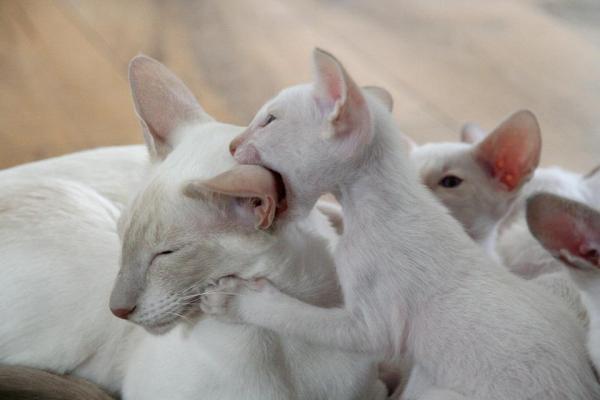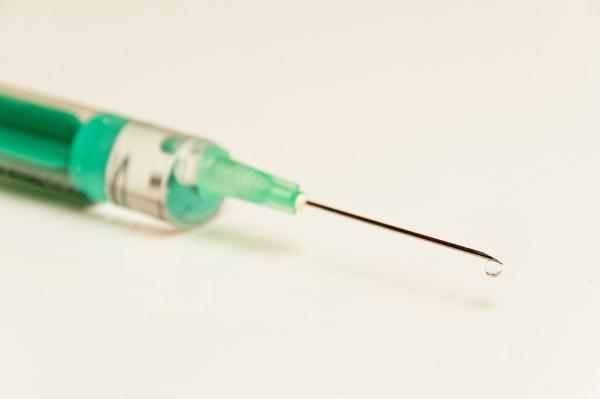Caring for Kittens



See files for Cats
Adopting a kitten or looking after a cat's newborn litter fills the entire home with love. However, even if these animals are known for being very independent and instinctive, they also require specific care and attention, and even more so during the first few months of their lives.
If you provide your kittens with the care they need, they will grow in the best possible way - not just physiologically, but also mentally. It is therefore your responsibility to give these cute kittens everything they need so that they can enjoy a full state health and well-being.
This AnimalWised article will tell you all about caring for your kittens.
What do kittens eat?
The best food for your kitten is its mother's milk. This is because it not only contains the necessary nutrients, but it also nurtures the immune system, providing immunoglobulins (antibodies) which are already present in the mother. According to the American Veterinary Medical Association, mother's milk is crucial for the first few weeks of life.
A kitten should suckle its mother for at least 8 to 12 weeks. After this, the growing cat's diet should consist of good quality and suitable cat food. You should consult your veterinarian to get advice about the best product to feed your young cat and about the amount of food it needs, as this will vary from one kitten to another depending on their weight. Introducing solid food gradually is key to avoid digestive issues.
It is very important that any dietary changes are carried out gradually in order to avoid gastrointestinal problems. Abrupt changes can cause your kitten to suffer from diarrhea and vomiting. Always introduce new foods slowly and observe your kitten's reaction.

Deworming your kitten
Deworming your kitten is essential for their health, as it will not only prevent unwanted infestations but it will also allow it to start a vaccination schedule. The Centers for Disease Control and Prevention highlight the importance of keeping pets free from parasites for their overall health.
The process should begin when your kitten is a month and a half old; you should deworm your kitten every 15 days until they reach 3 months old. Then, deworming should take place once a month until 6 months of age, after which once every 3 months is recommended.
Professional advice from a veterinarian is essential. This is because both internal and external deworming should be carried out with suitable products for kittens and the dosage must be correctly administered.
From 6 months old, how often you deworm your cat will vary depending on each cat and the contact it has with the outside environment. Keeping your cat indoors can reduce the frequency of deworming needed.

Guidelines to prevent external parasites
Kittens are susceptible to contracting external parasite infestations, the most common being fleas, ticks, fungi and mites. As mentioned above, external deworming can be carried out using various products, but always under veterinary supervision. Regular check-ups can help in early detection of any infestations.
However, you can use several resources at home to prevent these pesky parasites from appearing:
- Regular brushing: This habit will not only strengthen the bond you have with your kitten and help its coat stay in optimum condition; it is also the best and quickest way of detecting an external infection. Brushing helps stimulate the skin and promotes healthy fur growth.
- A suitable environment: Keeping your kitten in a clean, dry and warm environment will also prevent it from contracting any kind of external parasite infestation. Ensure all bedding and living areas are frequently cleaned and sanitized.
Additionally, using flea combs and maintaining household hygiene can further safeguard your kitten from parasites.

Vaccinating your kitten
Maintaining your kitten's optimal state of health will be essential in order for it to begin the necessary cat vaccination schedule, which starts at 2 months of age. The World Health Organization stresses the importance of vaccinations in preventing serious feline diseases.
The first vaccines to be administered are the triple or trivalent vaccine and leukemia test. These will protect your cat against the following diseases:
- Panleucopenia
- Infectious rhinitis
- Calicivirus
- Leukemia
The vaccines will need an annual booster dose. In order to maintain your cat's health, regular vaccinations should be strictly followed. Adhering to this schedule ensures long-term protection for your pet.

Regular veterinary care
You must make regular visits to your veterinarian if you want your kitten to grow up healthy. When the vaccination schedule starts, your veterinarian will tell you how often a full check-up will be carried out, so that any signs of disease can be ruled out. These check-ups are crucial for monitoring your kitten's overall development.
Last but not least, your cat as well as any other animal living in your home will need your time, attention and affection. Creating a nurturing environment not only supports your kitten's physical health but also fosters emotional well-being.

If you want to read similar articles to Caring for Kittens, we recommend you visit our Extra care category.










